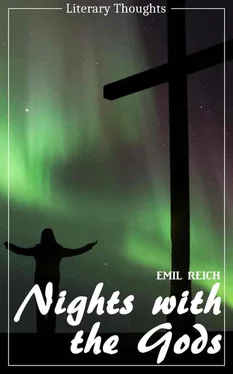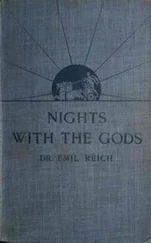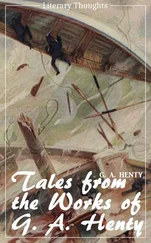Emil Reich - Nights with the Gods (Emil Reich) (Literary Thoughts Edition)
Здесь есть возможность читать онлайн «Emil Reich - Nights with the Gods (Emil Reich) (Literary Thoughts Edition)» — ознакомительный отрывок электронной книги совершенно бесплатно, а после прочтения отрывка купить полную версию. В некоторых случаях можно слушать аудио, скачать через торрент в формате fb2 и присутствует краткое содержание. Жанр: unrecognised, на английском языке. Описание произведения, (предисловие) а так же отзывы посетителей доступны на портале библиотеки ЛибКат.
- Название:Nights with the Gods (Emil Reich) (Literary Thoughts Edition)
- Автор:
- Жанр:
- Год:неизвестен
- ISBN:нет данных
- Рейтинг книги:4 / 5. Голосов: 1
-
Избранное:Добавить в избранное
- Отзывы:
-
Ваша оценка:
- 80
- 1
- 2
- 3
- 4
- 5
Nights with the Gods (Emil Reich) (Literary Thoughts Edition): краткое содержание, описание и аннотация
Предлагаем к чтению аннотацию, описание, краткое содержание или предисловие (зависит от того, что написал сам автор книги «Nights with the Gods (Emil Reich) (Literary Thoughts Edition)»). Если вы не нашли необходимую информацию о книге — напишите в комментариях, мы постараемся отыскать её.
presents
Nights with the Gods
by Emil Reich
–
"Nights with the Gods" was written in 1909 by historian Emil Reich (1854-1910) as a criticism of modern English society.
All books of the Literary Thoughts edition have been transscribed from original prints and edited for better reading experience.
Please visit our homepage literarythoughts.com to see our other publications.
Nights with the Gods (Emil Reich) (Literary Thoughts Edition) — читать онлайн ознакомительный отрывок
Ниже представлен текст книги, разбитый по страницам. Система сохранения места последней прочитанной страницы, позволяет с удобством читать онлайн бесплатно книгу «Nights with the Gods (Emil Reich) (Literary Thoughts Edition)», без необходимости каждый раз заново искать на чём Вы остановились. Поставьте закладку, и сможете в любой момент перейти на страницу, на которой закончили чтение.
Интервал:
Закладка:
"Thousands of years ago Nature found out that, with all these endless vegetal and animal specialists on hand, she would soon have to declare herself bankrupt. One specialist ignored the other; or hampered, hurt, and paralysed the other; they could not understand one another, because they had no common interest. In her predicament, Nature created human beings for the same reason that men invented the locomotive or the telegraph. She could no longer be without him. Man was, by his very needs, obliged to drop over-specialisation. He interested himself, for a variety of ends and reasons, in stones as much as in plants and animals. By exterminating some of the most damaging species of animals, he saved the life of millions of specimens of other animals that would otherwise have been killed out by ferocious specialists, such as the tiger, the leopard, and the wolf. The same he did to plants, and partly to rivers and lakes. He brought a little order into this pandemonium of specialists in Nature.
"Look at the sea. There man was unable to exert his power for order by general ideas. Look at the indescribable disorder and chaos and monstrosity of life and living beings in the sea. They are hideous, like an octopus; short-lived, nay, of a few minutes' duration, like the jelly-fish; fearful and yet cowardly like a shark; abominably under-sized or over-sized; incapable of any real passion, except that of eating and drinking. This liquid mass of fanatic and unsystematised specialists render the sea as inferior to the land as is Thibet to Holy Athens. People travelling in that ocean of specialists are exasperated by foul sea-sickness; and empires built on it have repeatedly been destroyed in a single week; ay, in one day.
"The dread of being swamped by specialists has driven Nature into creating the most grotesque compositions of beings half plant and half animal, or half stone and half plant; or again half male and half female; or half land-animal, half fish. Another way adopted by Nature in her attempt to obviate the ravages of specialists was by giving them exceedingly short shrift, and just a mere speck of existence; or again by forcing them to form big corporations and societies, such as forests, prairies, meadows, swarms, troupes.
"In fact Nature is a free lance fighting incessantly the evil done by the specialists. Ask Poseidon what trouble the sea gives him; ask Æolus how his life is made a misery through the mad freaks of the various specialists in winds. And what is the deep, underlying reason of all this insane race for specialism? I will tell you that in one word. It is Envy and Jealousy. In certain countries Envy and Jealousy are the inextinguishable and ubiquitous hydra of life.
"Take England. She is a democracy, if a masked one. Hence Jealousy is the dominating trait of her citizens. Jealousy has, thousands of years ago, invented railways, telegraphs, wired and wireless ones, telephones and Röntgen-rays, and all the rest of the infernal machines whereby Space, Time, and Work is shortened, curtailed, annihilated. Jealousy has at all times sent wireless messages over and through all the houses of a town or an entire country. It has Röntgenised the most hidden interiors; and its poison runs more quickly through all the veins and nerves of men than does the electric spark.
"Look at the customs, social prejudices, or views of that nation. Over one half of them was introduced to disarm the ever-present demon of Jealousy. Why is a man a specialist? Because in that way he disarms Jealousy more quickly and more surely than by any other expedient. It gives him an air both of modesty and of strength by concentration. In reality it does neither. It is only an air. The so-called Reality consists of nothing but unrealities, of shams, and masks. A specialist is not a master of his subject; he is a master of the art than which there is no greater, the art of making other people believe that you are not what you are, but what they want you to be.
"Nature has a horror of specialists; and she will reveal her secrets to an insane poet rather than to a specialist. Most great inventions were made either by 'outsiders,' or by young men who had not yet had the time to harden into specialists. In specialisation there is nothing but a total misunderstanding of Nature.
"Nature acts by instantaneous correlation and co-operation of different parts to one end; and to specialise is tantamount to taking a clock to pieces, putting them separately in a row on the table, and then expecting them to give you the exact time.
"In Nature there is no evolution, but only co-evolution; there is no differentiation but only co-differentiation. The little ones have quite overlooked all that; and that is why so many of the statements of co-differentiation in my zoology can be neither confirmed nor refuted by them. Who dare say which is a 'part' in Nature? Is the hand a 'part,' that is, something that might legitimately be told off as a speciality? Or must it be studied in connection with the arm, or with its homologies in the nether part of the body?
"In the same way: what constitutes a 'period' in history? Any division of a hundred or a thousand years by two, three, or four? Or by a division of twenty-five or thirty only? Who can tell? A man who says he is a specialist in the thirteenth century, is he not like a man who pretends that he is a specialist in respiration in the evening?
"Nature does specialise; witness her innumerable specialists. But do we know, do we possess the slightest idea as to how she does it? Can we prove why a goose has its peculiar head and not that of a stork? Evidently not, because we do not know what Nature calls a part, a speciality. She abhors specialists, just because they know so little of her way of specialising."
At this point of Aristotle's speech, Aristophanes asked for leave to protest. Having obtained it from Zeus, he commenced forthwith: "O Father of Nature and Man, I can no longer stand the invective of the Stagirite. In his time he was prudent enough to postpone his birth till after my mortal days; otherwise I should have treated him as I did Meton and Socrates, and other philosophers. But here he shall not escape me. Just imagine, this man wants to deprive creation of the best fun that is offered to the thinking beings amongst animals and humans.
"I wish he had overheard, as I have, when the other night I passed through an old forest near Darlington, a conversation between an old owl, a black woodpecker, and a badger. The owl sat, somewhat lower than usual on a birch-tree, while the woodpecker stopped his work at the bark of the groaning tree, and the badger had left his hole in order to enjoy the cool breath of the night. The owl said: 'Good-evening, Mr Woodpecker, how is business? Many worms beneath the bark?' The woodpecker replied: 'Thanks, madam, there is a slump, but one must put up with what one can get.'
"The badger then complained that he passed tedious hours in the ground, and he wished he could again see the exciting times of a few hundred thousand years ago when earthquakes and other catastrophes made existence more entertaining. 'Quite so,' said the owl, 'the forest is getting too civilised, and too calm. But you see, my friends, I have provided for much solid amusement for my old days. I used to visit a human's room, who read a great number of books. I asked him to teach me that art. I found it easy enough, only that these humans will read in a straight line from left to right, and I am accustomed to circular looks all round.
"'When I had quite acquired the art, I read some of his books. They were all about us folk in the forest. Once I chanced upon a chapter on owls. You may easily imagine how interested I was. I had not yet read a few pages, when I was seized with such a laughter that the professor became very indignant and told me to leave him. This I did; but whenever he read his books, I read them too, perched on a tree not far from his study. I cannot tell you how amusing it was.
Читать дальшеИнтервал:
Закладка:
Похожие книги на «Nights with the Gods (Emil Reich) (Literary Thoughts Edition)»
Представляем Вашему вниманию похожие книги на «Nights with the Gods (Emil Reich) (Literary Thoughts Edition)» списком для выбора. Мы отобрали схожую по названию и смыслу литературу в надежде предоставить читателям больше вариантов отыскать новые, интересные, ещё непрочитанные произведения.
Обсуждение, отзывы о книге «Nights with the Gods (Emil Reich) (Literary Thoughts Edition)» и просто собственные мнения читателей. Оставьте ваши комментарии, напишите, что Вы думаете о произведении, его смысле или главных героях. Укажите что конкретно понравилось, а что нет, и почему Вы так считаете.












